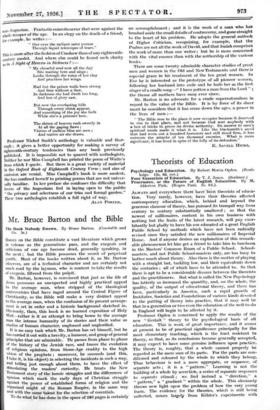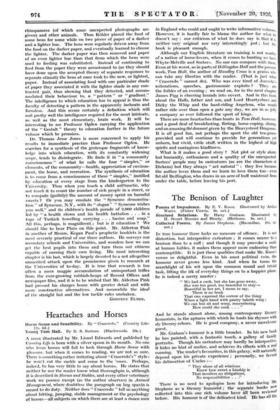Theorists of Education
ALWAYS and everywhere there have been theorists of educa- tion. Very rarely, however, have their theories affected contemporary education, which, behind and beyond the generous clamour of theory, has pursued its tranquil way from century to century substantially unaltered ; so that the newest of millionaires, content in his own business with nothing but the fruits of the latest research, will pay exor- bitantly but gladly to have his son educated at a great English Public School by methods which have not been radically revised since they satisfied the new millionaires of Imperial Rome. And if anyone desires an explanation of this remark- able phenomenon let him get a friend to take him to luncheon in the Masters' Common Room of a Public School. School-
masters, and not Public School-masters only, are too busy to bother much about theory. Also there is the matter of playing with a straight bat, tackling low, and their equivalents down the centuries ; all of which have to be attended to. So that there is apt to be a considerable divorce between the theorists and the practitioners. But what is called the New Psychology has latterly so increased the quantity, and, on the whole, the quality, of the output of educational theory, and there has been, particularly in America, such a rapid growth of Institutes, Societies and Foundations of various kinds devoted to the putting of theory into practice, that it may well be that in a generation or two even the education of the well-to-do in England will begin to be affected by it.
Professor Ogden is concerned to apply the results of the new " Gestalt " theory to the psychological basis of all education. This is work of great importance, and it seems at present to be of practical significance principally for the most elementary teaching, which is the least resistant to theory, so that, as its conclusions become generally accepted, it may expect to have some genuine influence upon practice. The theory is, roughly, that a whole cannot properly be
regarded as the mere sum of its parts. For the parts are con- ditioned and coloured by the whole to which they belong.
Thus behaviour is not a mere aggregate, or sequence, of separate acts ; it is a " pattern." Learning is not the building of a whole by accretion, a series of separate responses to separate stimuli ; we find instead a " direction," a " pattern," a. " gradient " within the whole. This obviously throws new light upon the problem of how the very young learn. The evidence for the theories, which is still being collected, comes largely from Raider's experiments with
chimpanzees (of which some unexpected photographs are given) and other animals. Thus Kohler placed the food of some hens for some while on two pieces of paper of a darker and a lighter hue. The hens were regularly driven away from the food on the darker paper, and eventually learned to choose the lighter. The darker paper was then removed and paper of an even lighter hue than that from which the hens were used to feeding was substituted. Instead of continuing to feed from the paper they were accustomed to (as they should have done upon the accepted theory of separate responses to separate stimuli) the hens at once took to the new, or lightest, paper. Instead of associating food with one particular shade of paper they associated it with the lighter shade in any con- trasted pair, thus showing that they detected, and accom- modated their behaviour to, a " pattern " or " gradient." The intelligence to which education has to appeal is thus the faculty of detecting a pattern in the apparently inchoate and formless. And this seems certainly a definition which will suit pretty well the intelligence required for the most intricate, as well as the most elementary, brain work. It will be interesting to see Professor Ogden carrying the application of the " Gestalt " theory to education further in the future volume which he promises.
Dr. Thomas Jesse Jones is more concerned to apply his results to immediate practice than Professor Ogden. He searches for a synthesis of the grotesque fragments of know- ledge into which education, with its constantly widening scope, tends to disintegrate. He finds it in " a community consciousness " of what he calls the four " simples," or elements, of the community—health, appreciation of environ- ment, the home, and recreation. The synthesis of education is to come from a consciousness of these " simples," instilled by education at every stage from the kindergarten to the University. Thus when you teach a child arithmetic, why not teach it to count the number of sick people in a street, or to compute (guiltily) the amount of money spent On harmful sweets ? Or you may emulate the " Skraeuse demonstra.: tion of Syracuse, N.Y., with its "slogan" " Syracuse wishes you well," and its children's health parade of 2,000 children led by " a health clown and his health battalion . . . in a toga of Turkish towelling carrying . . . basins and soap." All this, perhaps, is magnificent.; but is it education ? We should like to hear Plato on this point. - Mr. Alderton Pink in another of Messrs. Kegan Paul's prophetic booklets is the most severely practical of our three authors. He surveys our secondary schools and Universities, and wonders how we can get the best pupils into them and turn them out citizens capable of earning their own living. His most interesting chapter is his last, which is largely devoted to a not altogether
unmerited attack upon the prominence given to research at the Universities of to-day. It is true that research is too often a mere magpie accumulation of unimportant trifles from the ever-growing rubbish-heaps of Record Offices and newspaper files, and it is to be wished that Mr. Alderton Pink had pressed his charges home with greater detail and with more constructive alternatives. And meanwhile the ideal of the straight bat and the low tackle rules unshaken.
GODFREY ELTON.



















































 Previous page
Previous page